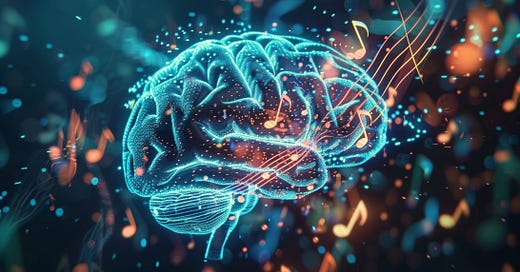Research Hit: Classical Music Synchronises Brain Waves and Improves Depression and Stimulates Brain Growth
Two pieces of research show universal benefits of classical and light music (compared to other forms).
This reminds me of that Mozart phase in the 1990s!
Yes, when a piece of research found that playing Mozart improved performance on IQ tests and everybody went crazy - such as playing Mozart to babies to increase IQ. It was later found that almost any type of music could increase scores, particularly the music you like. It simply elevated mood and energy, which leads to better cognitive processes.
This research by Xin Lv et al. was better done than that and measured brain waves in patients who had brain implants.
Another unrelated study also showed improved brain activity and different forms of plasticity (growth) with light and classical music!
Ok, so what did they find?
Lv et al. wanted to study the effects of music on depression and recruited 13 patients who had treatment resistant depression and had undergone deep brain stimulation surgery (this is when electrodes are implanted deep in the brain’s reward centre acting like a pacemaker in the brain). This enabled them to get precise recordings of different regions in the human brain.
What they found was that there was neural synchronisation between the auditory regions and emotional processing centres particularly those for reward processing.
And is this just for classical music?
Well, the researchers actually split the group into those who rated themselves as being appreciative of music and those that didn’t. And these two groups showed significant differences. Those that had higher music appreciation showed greater synchronisation and higher reward and antidepressant effects.
The effects were still present in both groups but magnified for those with music appreciation. So it could be that simply being more “musical” makes this more effective.
But still fascinating that music, and particularly classical, can have anti-depressant effects.
But to answer your previous question another group of researchers also in China investigated depression and found increased activation of pathways that contribute to brain plasticity (growth that is) with different types of music. With only some types of music showing a benefit.
Tell me more!
What’s more this was research in mice.
Playing different types of music to mice, you’re kidding me?!
No, and the effects were also impressive:
Light and classical music, but not atonal composition and rock music alleviated depression-like behaviours.
Light and classical music decreased corticosterone (stress hormones)
Light and classical music enhanced BDNF signalling (for growth), synaptic proteins (helping with rewiring between brain cells), and neurogenesis (formation of new brain cells).
Amazing that they found anything at all in mice who we do not consider musical. There certainly seems to be something universal about music (some do consider it a basic need).
So music increases brain synchronisation, increase reward centre activity, reduces depression, reduces stress, and can stimulate brain growth.
Yup, not bad - but it seems like it has to be the right type of music and it certainly helps if you appreciate music - which I do - so good for my brain!
Reference
Xin Lv, Yuhan Wang, Yingying Zhang, et al.
Auditory entrainment coordinates cortical-BNST-NAc triple time locking to alleviate the depressive disorder.
Cell Reports, 2024; 114474
DOI: 10.1016/j.celrep.2024.114474
Hong-Yu Cheng, Hao-Xue Xie, Qian-Lan Tang, et al.
Light and classical music therapies attenuate chronic unpredictable mild stress-induced depression via BDNF signaling pathway in mice
Cell Press, 2024
DOI:https://doi.org/10.1016/j.heliyon.2024.e34196




